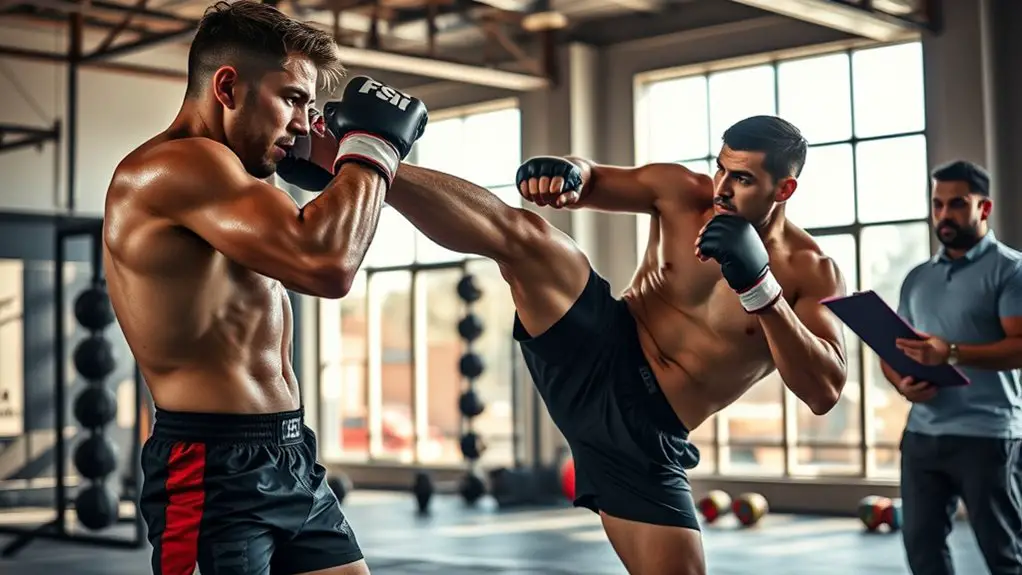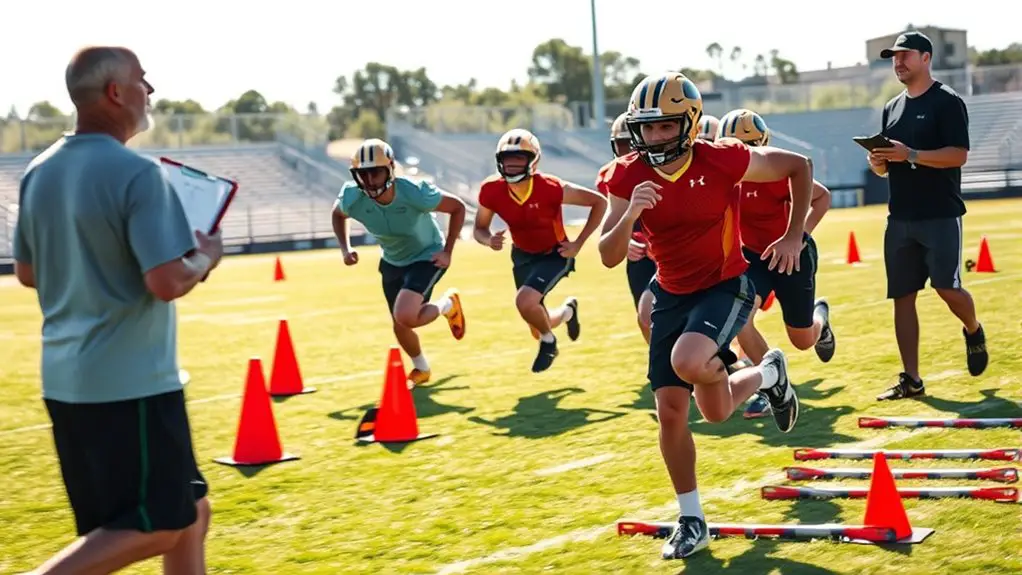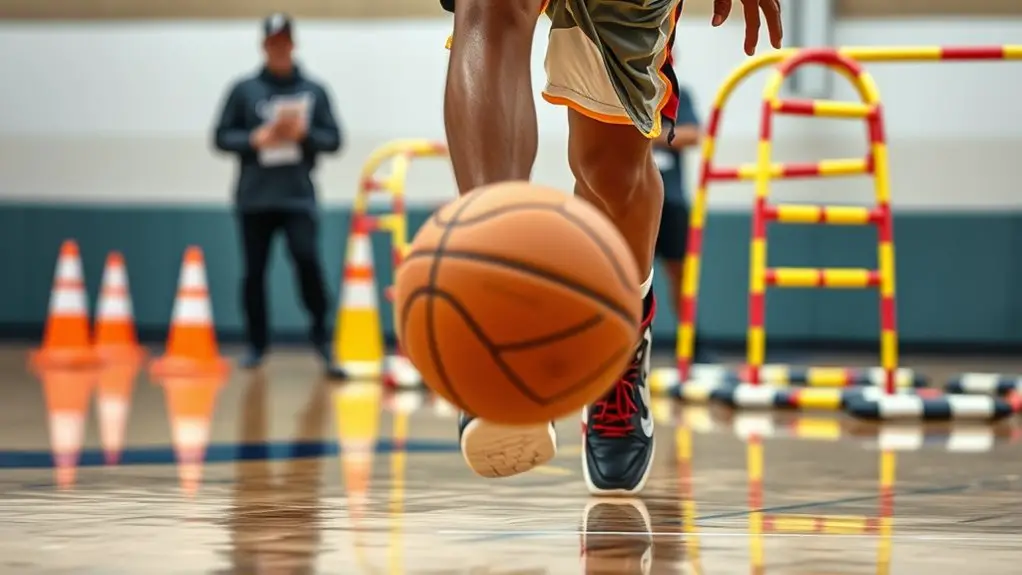To optimize your performance as an MMA fighter, combine strength training with cardiovascular conditioning, flexibility exercises, and skill-specific drills. Focus on compound movements for power, incorporate HIIT for endurance, and engage in dynamic stretches for flexibility. Don't forget about sparring sessions to refine techniques and live training for real fight conditions. Recovery is just as important, so prioritize nutrition and hydration. If you want to learn more about effective routines, keep exploring!
Strength Training for MMA Fighters
Strength training is essential for MMA fighters, as it builds the power and endurance needed for intense competition. When you focus on strength, you're not just enhancing your ability to throw punches and kicks; you're also laying the groundwork for overall performance. Lifting weights, performing bodyweight exercises, and incorporating resistance training can boost your explosiveness and help you maintain control during grappling exchanges.
You'll want to prioritize compound movements like squats, deadlifts, and bench presses, which engage multiple muscle groups and mimic the dynamic actions you'll face in the ring. Don't forget to incorporate functional movements that improve balance and stability; these are key for evading strikes and executing techniques effectively. Including exercises like Olympic lifts can significantly enhance your explosive strength and overall athletic performance.
As you progress, adjust your routines to challenge yourself and avoid plateaus. Remember, strength training isn't just about size; it's about freedom—the freedom to dominate your opponent and express your skills fully.
Cardiovascular Conditioning
While strength is essential, cardiovascular conditioning is equally important for MMA fighters, as it enhances endurance and recovery during bouts. You'll want to incorporate various cardio methods into your routine to optimize performance. High-intensity interval training (HIIT) is a great choice; it simulates the stop-and-go nature of fights, pushing your limits while improving your stamina. Additionally, conditioning regimens that combine aerobic and anaerobic exercises are crucial for building overall performance. Running, cycling, and swimming also play key roles in building aerobic capacity. Mix longer, steady-state sessions with shorter, intense bursts to keep your body adapting. Don't forget to include sports-specific drills, like shadowboxing or bag work, which can elevate your heart rate while honing your skills.
Flexibility and Mobility Exercises
After developing your cardiovascular endurance, it's time to focus on flexibility and mobility exercises, which are vital for maintaining a full range of motion and preventing injuries. Incorporating dynamic stretches into your routine helps loosen tight muscles and improves your overall performance in the cage. Think leg swings, arm circles, and hip openers to get your blood flowing.
Static stretching post-workout is important too. Target areas like hips, hamstrings, and shoulders to enhance your flexibility over time. Yoga or Pilates can also be fantastic for building mobility and core strength, giving you the freedom to move fluidly during fights. Additionally, engaging in mobility training can significantly reduce your risk of injury and improve your movement efficiency.
Don't forget about foam rolling. It releases muscle tightness and promotes recovery, keeping you feeling agile and ready to roll. Remember, a flexible fighter is a versatile fighter, so make these exercises a regular part of your training regimen to release your full potential.
Skill-Specific Drills
When it comes to improving your MMA skills, focusing on specific drills is key. You'll want to practice striking techniques, engage in grappling drills, and prioritize sparring sessions to sharpen your abilities. Each of these components plays a crucial role in your overall performance in the cage. Incorporating plyometric exercises can also significantly enhance your speed and agility, vital for successful movement in fights.
Striking Techniques Practice
Mastering striking techniques is essential for any MMA fighter looking to gain an edge in the cage. To enhance your striking skills, focus on these key drills:
- Shadow Boxing: Visualize an opponent while practicing your punches, kicks, and footwork. This builds muscle memory and improves timing without the pressure of an actual fight.
- Heavy Bag Work: Use a heavy bag to develop power and accuracy. Focus on combinations and practice pivoting and angles to simulate real fight scenarios.
- Pad Work: Partner with a trainer or teammate to practice striking on focus mitts. This helps refine your technique, speed, and reaction time while giving you immediate feedback.
Commit to these drills regularly, and you'll see significant improvements in your striking game!
Grappling Drills Overview
While striking is essential, grappling is equally important for MMA fighters, as it allows you to control the fight and capitalize on opportunities. By incorporating specific grappling drills into your routine, you'll enhance your skills in takedowns, submissions, and positional control. Focus on drills that improve your timing, balance, and reaction speed. For instance, practice ground escapes and rolling techniques to sharpen your ability to shift between positions. Partner drills can also help you understand the dynamics of leverage and pressure. Remember, the goal is to become fluid and adaptable. Ultimately, mastering these grappling techniques will give you the freedom to dictate the pace of the fight and respond effectively to your opponent's moves.
Sparring Sessions Importance
Sparring sessions are essential for developing the skills that set you apart in MMA. They allow you to practice techniques in real-time, adapting to the unpredictable nature of a fight. Here's why you shouldn't skip them:
- Realistic Experience: You'll face live resistance, helping you learn how to react under pressure.
- Technique Refinement: Sparring highlights your strengths and weaknesses, giving you the chance to fine-tune your skills.
- Mental Conditioning: It builds your confidence and mental toughness, vital for facing opponents in the ring.
Incorporating regular sparring sessions into your training routine will not only enhance your technical abilities but also empower you to express yourself freely in the cage. Remember, it's all about growing as a fighter!
Sparring and Live Training Sessions
As you hone your skills in MMA, integrating sparring and live training sessions into your routine is essential for developing real-time reaction and strategy. These sessions push you beyond the confines of drills, allowing you to adapt to a dynamic opponent. You'll learn to read movements, anticipate strikes, and exploit openings—skills that can't be mastered through solo practice alone.
Sparring isn't just about testing your techniques; it's an opportunity to cultivate resilience and mental fortitude. As you face different partners, you'll experience varied styles and intensities, which helps you refine your game plan. Don't shy away from challenging sparring partners; they'll elevate your experience and keep you on your toes. Always remember that fear can serve as a powerful motivator during these sessions, pushing you to overcome adversity and perform at your best.
Always stay mindful during these sessions, focusing on your breathing and maintaining fluidity. Embrace the unpredictability, and you'll find yourself growing stronger, more confident, and ready to take on any opponent that comes your way.
Recovery and Injury Prevention Techniques
To guarantee you're at your best during training and competition, prioritizing recovery and injury prevention techniques is essential. You want to keep your body in peak condition, and these strategies can help you do just that:
Prioritize recovery and injury prevention to keep your body in peak condition for training and competition.
- Active Recovery: Incorporate light activities like walking or yoga on your rest days to promote blood flow without overexerting yourself.
- Stretching and Mobility Work: Spend time each day on dynamic stretching and mobility drills. This'll keep your muscles flexible and reduce the risk of strains.
- Rest and Sleep: Don't underestimate the power of sleep. Aim for 7-9 hours of quality rest each night to allow your body to repair and rejuvenate. Additionally, recognizing signs of fatigue can help you determine when to take necessary breaks for optimal performance.
Nutrition and Hydration Strategies
While training hard is vital for MMA fighters, what you eat and drink can greatly impact your performance and recovery. Fueling your body with the right nutrients guarantees you've got the energy to push through those intense training sessions. Focus on lean proteins, whole grains, and plenty of fruits and veggies. They'll keep your muscles strong and your immune system in check.
Hydration's just as important. Dehydration can zap your energy and hinder your performance. Make it a habit to drink water throughout the day, especially before, during, and after workouts. You might also consider electrolyte drinks if you're sweating heavily; they'll help replenish lost minerals. Staying hydrated supports optimal performance and helps avoid fatigue and cramps.
Listen to your body; it knows what it needs. By prioritizing good nutrition and proper hydration, you're setting yourself up for success in the cage. Remember, this journey is about finding what works best for you, so don't hesitate to experiment!
Frequently Asked Questions
How Often Should MMA Fighters Change Their Workout Routines?
You should change your workout routines every 4 to 6 weeks to keep things fresh and prevent plateaus. Mixing it up keeps your body challenged, helps avoid boredom, and guarantees continuous improvement in your skills.
What Are the Best Supplements for MMA Fighters?
Did you know nearly 70% of fighters use supplements to enhance performance? You'll want to contemplate protein powders, BCAAs, and creatine to boost recovery and strength, helping you feel unstoppable in your training and competition.
How Important Is Mental Training for MMA Fighters?
Mental training's essential for you as an MMA fighter. It sharpens focus, boosts confidence, and helps you handle pressure. Embracing this aspect can elevate your performance, making you more resilient both in and out of the ring.
Can Yoga Benefit MMA Fighters' Performance?
Absolutely, yoga can enhance your flexibility, balance, and mental focus. It helps you recover faster and manage stress, making it a great addition to your training routine. You'll feel more centered and prepared for competition.
What Role Does Sleep Play in an MMA Fighter's Training?
Sleep's essential for your recovery and performance. It helps your body repair, boosts mental clarity, and enhances focus. Without enough rest, you'll struggle to train effectively and may even increase your risk of injury.




